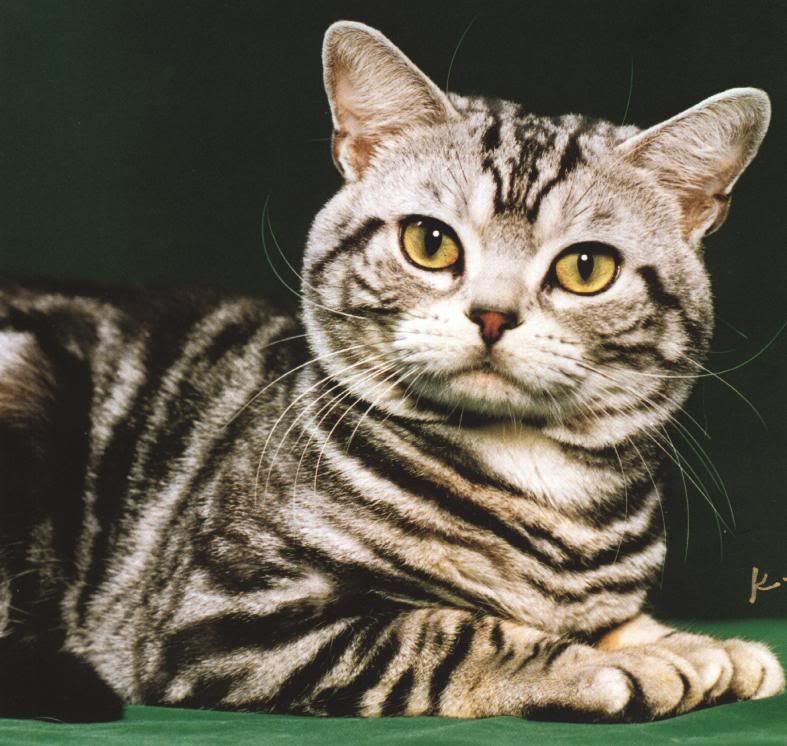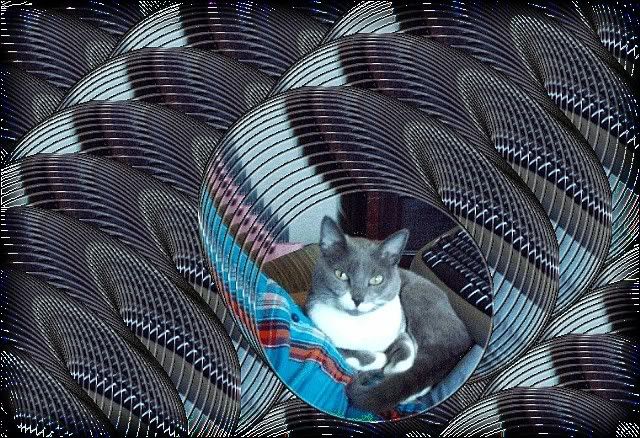
Trying to analyze the fascination of cats is probably hopeless. You get it or you don't. Why should they be so much more intriguing than other animals? Maybe they aren't — maybe all creatures are fascinating if you get to know them. There's that blonde Englishwoman, quite a dish in her prime, who has spent her life relating to orangutans and such. I don't get that, but maybe she thinks my preference for cats is hopelessly bourgeois and unadventurous.
Could it be the complex and contradictory nature of cats that is compelling? They are extremely loyal to the people they live with, but can seem distant, self-contained. They're soft, seemingly gentle, but ruthless killers. You think they're sound asleep, well lost to the world, then in a second they're as alert as a Secret Service agent. Seen from the front, they look so serious; from the side, they seem to be smiling.
Surely cats are among the most beautiful of animals (except for those hairless or spider-legged monsters bred by mad scientist "cat fanciers"). So graceful, so … flexible: it's amazing to see them sprawled on the floor, front paws in one direction, back paws in the opposite, apparently perfectly comfortable. What must it feel like to be able to scratch your ear with your "foot"?
Cats are lunar, yin, inward. They know things, and remind me of Walter Pater's famous description of the Mona Lisa (which painting, incidentally, was obscure until his purple Victorian prose caught the art world's imagination and eventually trickled down to the masses):

Could it be the complex and contradictory nature of cats that is compelling? They are extremely loyal to the people they live with, but can seem distant, self-contained. They're soft, seemingly gentle, but ruthless killers. You think they're sound asleep, well lost to the world, then in a second they're as alert as a Secret Service agent. Seen from the front, they look so serious; from the side, they seem to be smiling.
Surely cats are among the most beautiful of animals (except for those hairless or spider-legged monsters bred by mad scientist "cat fanciers"). So graceful, so … flexible: it's amazing to see them sprawled on the floor, front paws in one direction, back paws in the opposite, apparently perfectly comfortable. What must it feel like to be able to scratch your ear with your "foot"?
Cats are lunar, yin, inward. They know things, and remind me of Walter Pater's famous description of the Mona Lisa (which painting, incidentally, was obscure until his purple Victorian prose caught the art world's imagination and eventually trickled down to the masses):
She is older than the rocks among which she sits; like the vampire, she has been dead many times, and learned the secrets of the grave; and has been a diver in deep seas, and keeps their fallen day about her; and trafficked for strange webs with Eastern merchants; and, as Leda, was the mother of Helen of Troy, and, as Saint Anne, the mother of Mary; and all this has been to her but as the sound of lyres and flutes, and lives only in the delicacy with which it has moulded the changing lineaments, and tinged the eyelids and the hands. The fancy of a perpetual life, sweeping together ten thousand experiences, is an old one; and modern philosophy has conceived the idea of humanity as wrought upon by, and summing up in itself, all modes of thought and life. Certainly Lady Lisa might stand as the embodiment of the old fancy, the symbol of the modern idea.

Above all, cats are mysterious. I would not change that for anything. But let me put a few questions on the table, in the hope that you who are more knowledgeable or wiser than I can shed some light:
Why do cats purr? It seems like the answer should be obvious, but it isn't. This strangely comforting sound and vibration has no obvious survival value.
Why do they raise and lower their front paws alternately when they first climb in your lap?
Why do they like the taste of fish? In a state of nature, cats — who avoid water — would rarely have the opportunity for a fish dinner.

Why do cats purr? It seems like the answer should be obvious, but it isn't. This strangely comforting sound and vibration has no obvious survival value.
Why do they raise and lower their front paws alternately when they first climb in your lap?
Why do they like the taste of fish? In a state of nature, cats — who avoid water — would rarely have the opportunity for a fish dinner.

How can a kitten make you believe, despite all your experience, that goodness and innocence are more real than their opposites and will ultimately prevail?
What is a cat looking at as she follows an invisible object in the air with her eyes? Are cats more psychic than most people? Do they see spirits?
Why do cats so enjoy having their cheeks rubbed?
Answers, or even speculations, please.
What is a cat looking at as she follows an invisible object in the air with her eyes? Are cats more psychic than most people? Do they see spirits?
Why do cats so enjoy having their cheeks rubbed?
Answers, or even speculations, please.




13 comments:
Purring is, I believe, a way for young, blind kittens to find their mother and her teats; likewise, the front paw thing also has to do with feeding at the teat. The cheeks contain glands that spread scent.
Thanks, Dennis. But don't male cats purr? I guess when evolution creates a useful capability (yes -- I'm an evolutionist, although not necessarily a 100 percent Darwinist) it doesn't always take the trouble to differentiate between which sex it's useful for and which it isn't.
Cats like to have their whole heads rubbed. They love being tickled under the chin.
But if a cat lets you stroke its belly, then you truly must be favoured.
Another interesting topic is where cats like to sleep. My cat would usually curl up at the bottom of my bed, but if I ever tried to coax her under the blankets she would try and escape at the earliest opportunity.
Cats also have no qualms about waking you up by sitting/climbing on your chest and face.
sidney,
The cats I live with are similar. But one of them likes to have her stomach rubbed, the other is bothered. And one loves to curl up under the blankets.
Both seem to respect my need to sleep -- as long as it's dark. They can't imagine why I would want to sleep in the morning and climb all over me. We need to reach an understanding about this.
Trying to explain the complex mysterious behavior and consciousness of cats (or of any sentient beings) as the result of random genetic mutations which are selected only because they help the possessor have more offspring is a losing endeavor. There's infinitely more at work here than survival and reproduction. Darwinism is a terrible obstacle and distraction to any attempt to understand and relate to the world in its fullness.
The other day I was in a store in my neighborhood where a gray cat hangs out. I got down next to it and petted it, then it turned over and allowed me to stroke its belly, then it got up and walked a few steps away, then it stopped and turned its head to the side, looking back at me, or so it seemed. The way it turned its head back was captivating, in a way I can't describe. I felt I was seeing a glimpse of the cat's selfhood, its consciousness, though the nature of that consciousness remains a mystery. Cats "own" themselves in a way no other creature does. They are the ultimate masters or mistresses of their own domain, complete within themselves.
If creatures and their qualities really came into being by Darwinian processes, they could have no consciousness, all the things about them that express consciousness are just illusions. The only thing that is real about them is mechanical behaviors that are there because they help in survival. So for example, Mr. Mangan says that purring helps the kittens find their mother. Meaning that a random genetic mutation caused a single cat to purr, and this trait helped its young find it better, and so they survived, and produced more offspring than the cats that didn't purr, and that trait became dominant. From this point of view, the purring doesn't exist as an expression of the total essence and personality of the cat, it came into being by an accident that was selected because it was useful. This Darwinian approach—like liberalism itself—empties the world of its actual experienced content and turns it into a desert.
Anyone can see that there is vastly more going on, more being expressed, in a cat's purring than simply the function of being heard! The purring expresses the cat's own experience, its consciousness, its nature as a cat. The Darwinian way of looking at things prevents us from seeing this wholeness, by reducing everything to a utilitarian explanation—a utility that not only fails to explain what is before us, in this case a cat's purring, but denies what is most distinctive about it—the quality and expressiveness of the purring, which is not needed if its only function is to allow the blind kittens to locate their mother.
Why do I say that if Darwinism were true, there could be no animal or human consciousness? Couldn't consciousness come into being by a random mutation, and help its possessor have more offspring, and so be selected?
No. And here's why. The thing that, according to Darwinism, helps the creature survive and have more offspring is either a change in its organic structure and functioning, or a change in its behavior. Darwinian advantageousness can only result from organic or behavioral changes in the creature, it cannot result from the creature's consciousness.
To this, the Darwinists might reply: But couldn’t it be the case that consciousness came into being by a random genetic mutation, and then this consciousness led to a behavioral change which assisted in survivability?
No. Here's why. Before the new behavior, which in this scenario is an outgrowth of consciousness, appears and is selected, the consciousness itself would have to appear and be selected. But consciousness that produces no outward behavioral change cannot be selected. Therefore the behavior that produces the actual advantage could never come into being. The behavior that produces a selective advantage could only come into being instantly, without any non-advantageous antecedent such as consciousness.
Only organic changes and behavioral changes can be selected. Consciousness cannot be selected, because, by itself, it doesn't change anything. Therefore, under the Darwinian theory of evolution, consciousness cannot come into being, consciousness cannot exist.
I'm not just saying that Darwinism fails to explain consciousness.
I'm saying that Darwinism positively precludes consciousness.
Kipling's Just So Stories includes a story about how the animals--but the cat not quite entirely--were domesticated ("The Cat That Walked By Himself"). It tells me more about the cat than Darwinian yarns do.
Consciousness cannot be selected, because, by itself, it doesn't change anything.
How then does Auster explain calculus?
"...pure mathematics notoriously finds all kinds of startling applications in the solution of technological and scientific problems that our ancestors could not possibly have conceived of, and it does so by generating theories that would have remained wholly unintelligible to them. That strongly supports the idea that mathematics can uncover aspects of the universe of which neither the usefulness nor even the existence could possibly have been manifested in the environment of our evolutionary adaptations (EEA) in which the basic functions of the brain were being shaped by natural selection."
Desmond Jones
If the brain is capable of operations that natural selection would never have passed on because they had no survival value, that's another reason to doubt natural selection as an all-purpose explanation of phylogeny.
Not necessarily.
"Human reason is a faculty evolved to help us survive in certain contexts, rather than reach the truth on every occasion, and historically we have rarely been challenged to work things out at such abstract levels."
Desmond Jones
It's true, as Mr. Jones says, that an all-purpose human reason could appear, having the potential abilities to deal with intellectual tasks, such as calculus, that were not needed in the immediate context. But to believe that this all-purpose human reason, with its practically infinite extensibility, came into existence as a result of a random genetic mutation which was then selected for its ability to deal with some immediate environmental challenge in the early Paleolithic, and that this faculty which appeared by accident, which was selected because it helped deal with some immediate environmental challenge, and which stayed in place for tens of thousands, also contained far vaster capabilities that were not used until tens of thousands of years later, seems to me the kind of assertion that a person could only believe if he were in the grip of religious faith.
Post a Comment